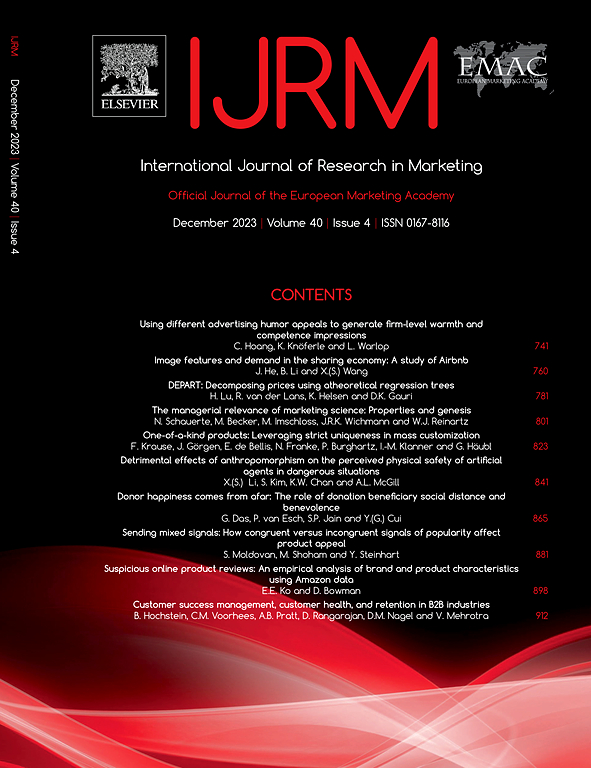Transaction-level wage transparency: How fair wage disclosure affects consumer preferences
IF 7.5
2区 管理学
Q1 BUSINESS
International Journal of Research in Marketing
Pub Date : 2025-09-01
DOI:10.1016/j.ijresmar.2024.11.006
引用次数: 0
Abstract
Firms are usually reluctant to disclose information about the production costs of their goods and services; however, some firms have recently started to disclose cost information to consumers. This research examines the consequences of disclosing transaction-level wage information on consumer preferences. Eight experiments, both in field and lab settings across multiple service domains, document that disclosing a service worker’s compensation can increase consumer preference for that firm’s service if the compensation is sufficiently high (i.e., perceived as fair by consumers). We provide evidence for a dual-process model, indicating that this greater preference for services provided in a fair-wage setting is driven by consumers’ feelings of anticipated guilt and higher expectations concerning quality. Available social norms regarding fair compensation and the nature of the service worker (human vs. non-human) are both identified as important boundary conditions of the psychological processes. This research offers a first step toward understanding the psychological and behavioral consequences of disclosing transaction-level wage information to consumers, thereby enabling managers to better identify when they should disclose wage information as part of their marketing strategy. This research also informs policy makers on how to encourage social preferences and consumer choices to promote fair outcomes for consumers, firms, and workers.
交易级工资透明度:公平的工资披露如何影响消费者偏好
企业通常不愿披露其产品和服务的生产成本信息;然而,一些公司最近开始向消费者披露成本信息。本研究考察了交易级工资信息披露对消费者偏好的影响。在多个服务领域的现场和实验室环境中进行的八项实验证明,如果薪酬足够高(即消费者认为公平),披露服务工作者的薪酬可以增加消费者对该公司服务的偏好。我们为双过程模型提供了证据,表明消费者对公平工资环境下提供的服务的更大偏好是由预期内疚感和对质量的更高期望驱动的。关于公平报酬的可用社会规范和服务工作者的性质(人类与非人类)都被确定为心理过程的重要边界条件。这项研究为理解向消费者披露交易级工资信息的心理和行为后果提供了第一步,从而使管理人员能够更好地确定何时应该将工资信息披露为其营销策略的一部分。这项研究还为政策制定者提供了如何鼓励社会偏好和消费者选择以促进消费者、企业和工人的公平结果的信息。
本文章由计算机程序翻译,如有差异,请以英文原文为准。
求助全文
约1分钟内获得全文
求助全文
来源期刊
CiteScore
11.80
自引率
4.30%
发文量
77
审稿时长
66 days
期刊介绍:
The International Journal of Research in Marketing is an international, double-blind peer-reviewed journal for marketing academics and practitioners. Building on a great tradition of global marketing scholarship, IJRM aims to contribute substantially to the field of marketing research by providing a high-quality medium for the dissemination of new marketing knowledge and methods. Among IJRM targeted audience are marketing scholars, practitioners (e.g., marketing research and consulting professionals) and other interested groups and individuals.

 求助内容:
求助内容: 应助结果提醒方式:
应助结果提醒方式:


